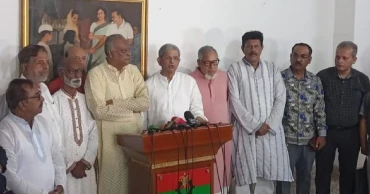opposition party
Resignation of South Korean President Yoon demanded over Martial Law
South Korea’s political landscape was shaken on Wednesday as the main opposition Democratic Party called for President Yoon Suk Yeol’s immediate resignation or impeachment. The demand came hours after Yoon rescinded a controversial martial law declaration, which had briefly brought military troops to parliament.
Yoon’s abrupt announcement of martial law on Tuesday evening aimed to combat what he termed “anti-state” forces but was overturned by a unanimous parliamentary vote. This marked South Korea’s first use of martial law in over 40 years, harking back to its pre-democracy era.
Opposition Outrage and Impeachment Threat
The Democratic Party, holding a parliamentary majority, condemned Yoon’s actions as unconstitutional and accused him of rebellion.
“President Yoon Suk Yeol’s martial law declaration was a clear violation of the constitution... a grave act of rebellion,” the party said in a statement, promising impeachment proceedings if Yoon refused to step down.
An impeachment would require a two-thirds parliamentary vote, needing support from at least 200 lawmakers. The Democratic Party and smaller opposition factions collectively control 192 seats. Notably, 18 members of Yoon’s ruling People Power Party (PPP) joined the 190-0 vote to annul the martial law.
If impeached, Yoon would be stripped of presidential powers pending a Constitutional Court ruling, with Prime Minister Han Duck-soo assuming interim responsibilities.
Yoon’s Declaration and Military Deployment
Yoon’s martial law authorized troop deployments to restrict parliamentary activities, sparking comparisons to South Korea’s military-backed governments of the past. Protesters outside the National Assembly faced soldiers armed with assault rifles and military helicopters.
While lawmakers were initially blocked from entering the National Assembly, opposition leader Lee Jae-myung livestreamed himself scaling a wall to access the chamber. Despite the heavy military presence, no major violence was reported, and troops withdrew after the vote to lift the martial law.
Read: South Korean Parliament overturns President’s Martial Law declaration
Critics, including legal experts and opposition leaders, argued Yoon’s actions violated constitutional provisions that limit martial law to wartime or comparable national emergencies. The constitution explicitly prohibits restrictions on parliamentary functions, which Yoon’s declaration attempted to enforce.
International and Domestic Responses
In Washington, the White House expressed “serious concern” over the events, noting that the Biden administration was not informed in advance of Yoon’s martial law declaration. Pentagon officials confirmed no impact on the 27,000 U.S. troops stationed in South Korea.
Domestically, the People Power Party leader Han Dong-hun criticized Yoon’s actions as unconstitutional, urging him to dismiss Defense Minister Kim Yong Hyun, who reportedly recommended the declaration.
Public reaction remained relatively muted, with life in Seoul appearing normal on Wednesday. Tourists and residents went about their routines, though increased police presence and lingering tension hinted at the political turmoil.
Echoes of South Korea’s Democratic Struggles
President Yoon’s martial law declaration and its swift reversal highlighted South Korea’s turbulent political history, including its transition to democracy in the late 1980s. Observers compared the current crisis to the 2017 impeachment of former President Park Geun-hye, who was removed from office and later imprisoned for corruption.
Read: Emergency martial law declared in South Korea
Natalia Slavney, an analyst with the Stimson Center’s 38 North program, described the martial law as a “serious backslide of democracy” in South Korea, noting an “alarming trend of abuse” during Yoon’s presidency.
As calls for Yoon’s resignation grow louder, South Korea faces an uncertain political future. The crisis underscores the fragility of democratic norms in the face of escalating political conflicts.
Source: With inputs from agencies
1 year ago
No dialogue with those who burn people to death: Foreign Minister Hasan Mahmud
Foreign Minister Dr. Hasan Mahmud today (January 15, 2024) firmly dismissed the possibility of engaging in discussions with those who instigate violence and anarchy in the nation.
"Dialogue is pointless with individuals who burn people alive and incite anarchy, rather than practicing legitimate politics," he declared to the press.
This strong statement came in response to inquiries about the Awami League's strategy to address challenges from the opposition party, BNP, in the upcoming days.
Read: Expats are our heroes; let’s work together to build Smart Bangladesh: FM
Dr. Mahmud, who also serves as the Awami League's joint secretary, emphasized the importance of this issue during a scheduled meeting of the Awami League central working committee, which will be attended by Prime Minister Sheikh Hasina.
In a broader context of regional cooperation, Dr. Mahmud met with Indian High Commissioner to Bangladesh, Pranay Verma. They discussed mutual support, particularly India's consistent backing of Bangladesh in maintaining a democratic trajectory.
“During the elections of 2014 and 2018, despite external attempts to stir controversy, India's support for our democratic process was unwavering,” Dr. Mahmud remarked.
Read: Indian, Sri Lankan FMs greet Hasan Mahmud; eye deepening ties with Bangladesh
Looking ahead, the Foreign Minister revealed plans for his first bilateral visit to India, accepting an invitation from his Indian counterpart, Dr. S Jaishankar. The visit aims to further strengthen diplomatic ties, with the exact date to be decided later. Additionally, Dr. Mahmud is set to embark on a multilateral tour to Uganda.
The meeting with the Indian High Commissioner marks Dr. Mahmud's first diplomatic engagement since assuming the office of Foreign Minister, highlighting his proactive approach in foreign affairs and regional cooperation.
2 years ago
Opposition parties’ 3-day countrywide blockade underway
A three-day blockade of road, rail and waterways, enforced by BNP and like-minded opposition parties, across the country began this morning to mount pressure on the Awami League government to quit and hold the next election under a non-party, neutral administration.
Bangladesh Jamaat-e-Islami also enforced the blockade simultaneously from this morning to Thursday evening with the same demands.
Apart from BNP and Jamaat, the 12-party alliance, Jatiyatabadi Samamona Jote, LDP, Gonoforum and People’s Party, Gonotantrik Bam Oikya, Gono Odhikar Parishad, Labour Party and NDM are also observing the programme separately.
Meanwhile, AL has vowed to resist any violence during the blockade.
Read more: Jamaat to observe countrywide blockade program on Oct 31 and Nov 1-2
Police and other law enforcement agencies have already alerted their units to increase vigilance and beef up security across the country.
Police have also taken up positions and set up checkpoints at the entry points and all major points of Dhaka.
After observing a day-long hartal, BNP Senior Joint Secretary General Ruhul Kabir Rizvi on Sunday evening announced the countrywide blockade for three consecutive days.
He, however, said vehicles of newspapers or media, ambulances and vehicles transporting oxygen cylinders and medicines will remain out of the purview of the three-day blockade.
Read more: BNP sends letter to foreign missions blaming govt, police for Oct 28 violence
2 years ago
Opposition parties to wage movement under Khaleda’s leadership: Fakhrul
BNP Secretary General Mirza Fakhrul Islam Alamgir today (October 03, 2022) said the planned “coinciding” movements by political parties to oust the current government of Bangladesh will be “under the leadership” of Khaleda Zia.
He said, “We have taken united steps (to hold coinciding movements) …We have already announced the (top) leader of our movement. Begum Khaleda Zia is our leader. In her absence, our acting chairman Tarique Rahman is our leader,” he said.
Fakhrul made the remarks while talking to reporters after a dialogue with Jatiya Party (Kazi Zafar), a partner of the 20-party alliance, at the BNP chairperson’s Gulshan office.
Also read: BNP determined to build non-communal Bangladesh: Fakhrul
He said they will start the simultaneous movement after completing the second round of dialogue with all the opposition parties.
The party began its second phase of talks with the first meeting with Kalyan Party on Sunday. The BNP Secretary General sat for dialogue with Jatiya Party (Kazi Zafar) on Monday with a goal to finalise the demands and issues that will be highlighted in the movement.
A nine-member delegation of the Jatiya Party, led by its chairman Mostafa Jamal Haider, joined the talks with Mirza Fakhrul and Nazrul Islam Khan, a standing committee member of BNP and 20-party coordinator.
Also read: Anti-govt Movement: BNP initiates 2nd phase of talks
Earlier, BNP had discussions with 23 parties during its first phase of talks that began on May 24 to work out the outline for launching a united movement to 'restore' democracy and people’s voting rights in Bangladesh.
3 years ago
Strong opposition is a must: PM Hasina
Prime Minister Sheikh Hasina on Sunday said a strong opposition in the country is a must to make democracy work for people.
"For a democracy, a strong opposition party is a must as we want our democratic trend continues," she said.
The Prime Minister said this while addressing the inaugural ceremony of 'Programmes of Mujib Borsho', 'Mujib Borsho website 2020-21' and digital compilation of Father of the Nation Bangabandhu Sheikh Mujibur Rahman by the 11th National Parliament at the Oath Room of the Jatiya Sangsad Bhaban.
5 years ago









